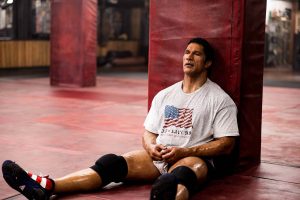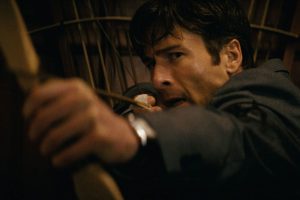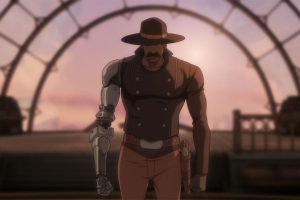
Sandwiched between Tribeca and the New York Film Festival on the tri-state festival calendar is the New York Asian Film Festival, presented by the New York Asian Film Foundation and Film at Lincoln Center. Read on for my thoughts on three films from this summer’s iteration of the festival: an ultraviolent Thai crime thriller, a throwback Hong Kong action bonanza, and a family-friendly Japanese tribute to tokusatsu.
Pattaya Heat (Yang Shupeng)
Pattaya Heat (2024)- source: New York Asian Film Festival
Pattaya City has acquired an international reputation as a hub for sex tourism and wild nightlife, and the latest film from writer-director Yang Shupeng doesn’t do anything to counter that; if anything, it embraces it with gusto. An ensemble thriller filled to overflowing with conniving crime bosses, corrupt cops, crazed killers, and almost as many splashes of dark comedy as blood, Pattaya Heat has a lot going on—but that doesn’t necessarily mean it has a lot going for it.
The film focuses on a plot by deranged casino boss Simon (Ananda Everingham) to have the house’s take sent to Bangkok, changed into gold bars, and brought back to Pattaya. Meanwhile, aging cop Chai (Thaneth Warakulnukroh) has developed a crippling gambling addiction in an attempt to pay his mentally ill daughter’s hefty medical bills; when he finds himself in debt to Simon, he ends up being recruited to help escort the gold. However, Gee (Chermarn Boonyasak), a woman who has channeled her tragic past into a criminal enterprise with a side of fortune-telling, wants to intercept the shipment and steal the gold and recruits ex-con Thod (Jirayu Thantrakul) to help her. Since his release from jail, Thod has been working in his brother’s pizza joint while dealing drugs on the side, something that his greedy sister-in-law Fah (Gulasatree Michalsky) would like to get it on. (She settles for sleeping with Simon instead.)
If you haven’t yet lost track of who is working with who (not to mention who is double-crossing who), enjoy it while you can! Pattaya Heat spends so much time introducing new characters that watching them all rampage through the neon-lit streets of Pattaya is more exhausting than energizing, which is not exactly what you want from a Guy Ritchie-esque crime caper (though to be fair, most of his more recent forays into the genre are pretty exhausting, too). The cast—a veritable who’s who of Thai stars—do an admirable job with what they’re given, but the script is too convoluted and the characterizations too weak for any of them to truly shine. The film is best when fists are flying and guns are blasting, thanks to the kinetic work of action director Yang Kil-Yong (Oldboy). But a great action movie should keep you fired up between fight sequences too, and unfortunately, Pattaya Heat is a little too lukewarm to get the job done.
Twilight of the Warriors: Walled In (Soi Cheang)
While Pattaya Heat may be a disappointingly pale imitation of better movies that have come before, Twilight of the Warriors: Walled In is a vibrant, energetic tribute to Hong Kong action flicks of yesteryear that stands on its own as an incredibly entertaining movie. Set in Kowloon Walled City during the 1980s—a densely populated, architecturally unsound enclave that serves as a safe haven for all kinds of refugees and outlaws—the film chronicles the misadventures of one young man who seeks refuge within the city, only to find himself at the center of a longstanding war between aging gang leaders.
Twilight of the Warriors: Walled In (2024)- source: New York Asian Film Festival
After trying to purchase a fake ID in the outside world and being ripped off by crime boss Mr. Big (the legendary Sammo Hung), refugee Chan Lok-kwan (Raymond Lam) seizes a bag of the boss’ goods (cocaine) and takes off. He manages to make it to the relative safety of Kowloon Walled City, where Cyclone (Louis Koo), a barber and martial arts master, and his gang of young fighters try to maintain a semblance of order. Soon, Chan is one of them, forming a formidable quartet with Shin (Terrance Lau), AV (German Cheung), and Twelfth Master (Tony Wu); when a sex worker is beaten to death by one of her customers, the four of them don masks and enact vigilante justice on the perpetrator. However, when Chan’s true identity is revealed, another crime boss named Chau (Richie Jen) demands his head as retribution for a past crime. Will Cyclone give it to him, or will he attempt to protect the young man who has quickly become like family?
Adapted from the novel City of Darkness by Yuyi, Twilight of the Warriors: Walled In had been in development since the early 2000s when it was set to be co-directed by John Woo and Johnnie To; the version to finally make it to the screen is directed by To protégé Soi Cheang, which is fitting considering the film’s focus on the passing of torches from one generation to the next. As bosses like Cyclone and Mr. Big are forced to make way for a new crop of outlaws to take their places, the aging actors who portray them symbolically step aside so that new stars like Lam can shine. That isn’t to say that Koo and Hung, in particular, have lost a step; they are both excellent, with Hung stealing every scene he’s in despite his limited screen time, and they more than hold their own in adrenaline-pumping fights with the younger generation. And those fights! They are thrilling, with the claustrophobic confines of Kowloon Walled City only adding to the intensity. (The film’s stunt coordinator is Kenji Tanigaki, whose credentials include several Donnie Yen movies; in other words, he’s pretty good at what he does.)
source: New York Asian Film Festival
Twilight of the Warriors: Walled In succeeds where Pattaya Heat fails by managing to make us care about what happens to key figures in this sprawling cast of characters; Cyclone is such a noble leader that you can’t help but root for him and his gang, and the bromance that blooms between the quartet of younger fighters will warm the cockles of your heart, even if one way they exhibit their deep connection to each other is for each of them to grab a limb of a guy they are fighting and together repeatedly slam him against the ground like he’s being bounced on a trampoline that doesn’t exist. (The power of friendship, indeed.) And while there are few women to be found on screen in Twilight of the Warriors: Walled In, that also means the film has fewer opportunities to stoop to the kinds of sexist humor that often littered similar Hong Kong movies in the 1980s; that’s one aspect of the era that I am definitely not nostalgic for. But the best homages don’t just imitate, they also update, and Twilight of the Warriors: Walled In definitely succeeds in updating the classic Hong Kong action flick for the twenty-first century.
Brush of the God (Keizô Murase)
On the opposite end of the cinematic spectrum from the unabashedly adult Pattaya Heat and Twilight of the Warriors: Walled In is the fantastical and family-friendly Brush of the God. The “first and last film” to be directed by legendary stuntman, suitmaker, and sculptor Keizô Murase —whose work can be seen in Mothra vs. Godzilla, Ghidorah, the Three-Headed Monster, and Gamera, among many other classic kaiju flicks—Brush of the God is an earnest ode to the tokusatsu films of the twentieth century as well as a passionate plea to keep this kind of practical effects-driven movie magic alive today. And while it’s not a brilliant movie, per se, you’ll find it hard to resist its charms.
Brush of the God (2024)- source: New York Asian Film Festival
Disillusioned teenager Akari (Rio Suzuki) shows up at the farewell party for her recently deceased grandfather, renowned special effects modelmaker Kenzo Tokimiya, more out of obligation than any real sense of affection or nostalgia; when she was little, she was a fan of her grandfather’s fantastical work, but now she mostly has mixed feelings about the man and his models. These phantasmagorical creatures are on display at the party so his fans, including Akari’s enthusiastic classmate, Takuya (Takeru Narahara), can get one last glimpse of his work.
Also present at the party is a mysterious young man named Hozumi (Takumi Saitoh, who tokusatsu aficionados should recognize from modern-day genre classics like Shin Godzilla and Shin Ultraman), who tells Akari and Takuya that he was set to be part of a production that Kenzo never got to finish, called Brush of the God. After Hozumi urges the kids to save the magical world that Kenzo devoted his life to depicting on screen, Akari and Takuya find themselves suddenly transported to said world: a world where the rampage of a fearsome, monstrous kaiju threatens to destroy everything Kenzo held dear.
Brush of the God (2024)- source: New York Asian Film Festival
Independently produced, with additional money raised via crowdfunding to polish up the special effects, Brush of the God clocks in at a mere 74 minutes but packs in enough cool creatures and magical situations for a much longer film. There is a strange, big-eared, bunny-like creature that ends up helping the kids on their quest that I fell madly in love with; it’s essentially an animatronic plushie, not at all realistic, but that doesn’t take away from how adorable it is. The plot is so flimsy that it frequently threatens to collapse under the weight of the kaiju, but the charm and creativity of the practical effects holds it all together. Essentially functioning as the final manifesto of Murase’s incredible career, Brush of the God urges us all—film industry and audience members alike—to keep the magic of tokusatsu alive even as films become increasingly reliant on computer-generated effects that sacrifice soaring imagination for harsh realism. And, awkward dialogue and occasionally cheesy moments aside, that’s something I can whole-heartedly get behind.
Does content like this matter to you?
Become a Member and support film journalism. Unlock access to all of Film Inquiry`s great articles. Join a community of like-minded readers who are passionate about cinema – get access to our private members Network, give back to independent filmmakers, and more.












